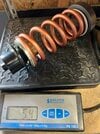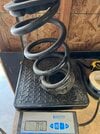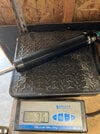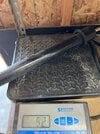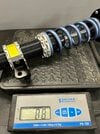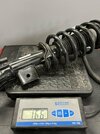Anyone have any draggy testing for light weight wheels with the M3P? If so, would you mind posting the weight of the wheels and the draggy results? Trying to see if it is worth it to spend $2k on wheels.
Welcome to Tesla Motors Club
Discuss Tesla's Model S, Model 3, Model X, Model Y, Cybertruck, Roadster and More.
Register
Install the app
How to install the app on iOS
You can install our site as a web app on your iOS device by utilizing the Add to Home Screen feature in Safari. Please see this thread for more details on this.
Note: This feature may not be available in some browsers.
-
Want to remove ads? Register an account and login to see fewer ads, and become a Supporting Member to remove almost all ads.
You are using an out of date browser. It may not display this or other websites correctly.
You should upgrade or use an alternative browser.
You should upgrade or use an alternative browser.
lightweight wheels model 3 performance 0-60 testing
- Thread starter Kaz93
- Start date
Save your money, it makes zero difference. I removed iirc, 48 pounds between wheels and rotors, and my car was down to the 1/100th of a second identical on a 0-60. I was able to do the same times for a little lower SOCs on the lightweight setup than the OEM setup could, but it never actually went any faster. Driving feedback was awesome though, and why I'm swapping out the new car's uberturbines for lighter setup.Anyone have any draggy testing for light weight wheels with the M3P? If so, would you mind posting the weight of the wheels and the draggy results? Trying to see if it is worth it to spend $2k on wheels.
Thanks,Save your money, it makes zero difference. I removed iirc, 48 pounds between wheels and rotors, and my car was down to the 1/100th of a second identical on a 0-60. I was able to do the same times for a little lower SOCs on the lightweight setup than the OEM setup could, but it never actually went any faster. Driving feedback was awesome though, and why I'm swapping out the new car's uberturbines for lighter setup.
Interesting as why you barely saw an increase in acceleration? Maybe being software limited, as a reduction in unsprung mass should result in increased speeds.
Correct, it's computer limited. Also, someone on here was able to get identical 0-60 times going uphill as they were able to on flat ground.Thanks,
Interesting as why you barely saw an increase in acceleration? Maybe being software limited, as a reduction in unsprung mass should result in increased speeds.
What is your wheel/tire setup? Thanks!Save your money, it makes zero difference. I removed iirc, 48 pounds between wheels and rotors, and my car was down to the 1/100th of a second identical on a 0-60. I was able to do the same times for a little lower SOCs on the lightweight setup than the OEM setup could, but it never actually went any faster. Driving feedback was awesome though, and why I'm swapping out the new car's uberturbines for lighter setup.
What is your wheel/tire setup? Thanks!
It was a set of Jova 18" wheels and the RB lightweight rotors. This is on the P3D-, not a long range.
Width and weight on the wheels? Thanks! Looks like someone is using those brakes!It was a set of Jova 18" wheels and the RB lightweight rotors. This is on the P3D-, not a long range.
View attachment 738699
17.8 pounds on the wheels, 18x8.5 35et. That's pretty much the way those brakes stayed because they couldn't tolerate heavy use. One of the reasons, in my opinion, people should use caution if considering the brand. With those on there, I experienced significant brake fade hard braking on the street.Width and weight on the wheels? Thanks! Looks like someone is using those brakes!
I know it's off topic. Are you saying the RB brake rotors and pads can't take the heat?17.8 pounds on the wheels, 18x8.5 35et. That's pretty much the way those brakes stayed because they couldn't tolerate heavy use. One of the reasons, in my opinion, people should use caution if considering the brand. With those on there, I experienced significant brake fade hard braking on the street.
Biggest performance benefit to lighter wheels/brakes is lower unsprung weight for enhanced handling. Mostly only relevant to those in competitive timed track events. Even on the street the car will feel more responsive and ride will improve, but little quantifiable benefits.
I know it's off topic. Are you saying the RB brake rotors and pads can't take the heat?
In my opinion, yes. I had the rotors turned, and after that you could see where spots of the metal had fused together (not sure what the correct term would be for that) and changed the appearance. The machinist that worked on them told me that it's common when cheap metal goes through high heat cycles.
jackmott
Member
I'm pretty skeptical of the idea that software is limiting the rate of acceleration, simply because that would be an odd choice. However, it is possible that some people are *traction* limited up to a pretty high speed out of the 0-60mph, at which point not much time is left for less mass to help, and at which point acceleration rates are lower so less mass wouldn't matter so much anyway.
Also some people have measured a tenth of improvement in 0-60 from light, forged wheels. Of course any experiment needs to carefully control for tire compound, width, and pressure to make sure traction hasn't changed.
But yeah don't expect noticeable difference in anything at all from lighter wheels on a car this heavy and powerful. There is always placebo effects with human perceptions and these things but the objective differences will be really tiny.
Also some people have measured a tenth of improvement in 0-60 from light, forged wheels. Of course any experiment needs to carefully control for tire compound, width, and pressure to make sure traction hasn't changed.
But yeah don't expect noticeable difference in anything at all from lighter wheels on a car this heavy and powerful. There is always placebo effects with human perceptions and these things but the objective differences will be really tiny.
Biggest performance benefit to lighter wheels/brakes is lower unsprung weight for enhanced handling. Mostly only relevant to those in competitive timed track events. Even on the street the car will feel more responsive and ride will improve, but little quantifiable benefits.
For those counting their pounds, lots of weight savings(not all unsprung but most of it) through the use of MCS 2WNR and Swift springs.
Attachments
Gasaraki
Active Member
Of course it's software limited. The LR and Performance have basically the same hardware yet the Performance is faster because the LR is limited. The question is how much is software limited vs the physical limitation of the motors and wires.I'm pretty skeptical of the idea that software is limiting the rate of acceleration, simply because that would be an odd choice. However, it is possible that some people are *traction* limited up to a pretty high speed out of the 0-60mph, at which point not much time is left for less mass to help, and at which point acceleration rates are lower so less mass wouldn't matter so much anyway.
Also some people have measured a tenth of improvement in 0-60 from light, forged wheels. Of course any experiment needs to carefully control for tire compound, width, and pressure to make sure traction hasn't changed.
But yeah don't expect noticeable difference in anything at all from lighter wheels on a car this heavy and powerful. There is always placebo effects with human perceptions and these things but the objective differences will be really tiny.
jackmott
Member
I am talking about the claims that limit is based on acceleration rate rather than amperage or something.Of course it's software limited. The LR and Performance have basically the same hardware yet the Performance is faster because the LR is limited. The question is how much is software limited vs the physical limitation of the motors and wires.
Also I believe this guy: https://www.youtube.com/c/Ingineerix has said that more recent LR cars have less power delivery electronics on the motor controllers than the performance, so no you can't just hack more power out of those, older ones you can, but motors may have been binned by their ability to take it.
Of course it's software limited. The LR and Performance have basically the same hardware yet the Performance is faster because the LR is limited. The question is how much is software limited vs the physical limitation of the motors and wires.
They switched over to the 990 motor/inverter on the LR and those can't handle as much power. The older LR had the same equipment as the Performance though.
I'm pretty skeptical of the idea that software is limiting the rate of acceleration, simply because that would be an odd choice. However, it is possible that some people are *traction* limited up to a pretty high speed out of the 0-60mph, at which point not much time is left for less mass to help, and at which point acceleration rates are lower so less mass wouldn't matter so much anyway.
Also some people have measured a tenth of improvement in 0-60 from light, forged wheels. Of course any experiment needs to carefully control for tire compound, width, and pressure to make sure traction hasn't changed.
But yeah don't expect noticeable difference in anything at all from lighter wheels on a car this heavy and powerful. There is always placebo effects with human perceptions and these things but the objective differences will be really tiny.
If you know more than those of us who have been recording data on these cars for over 2 years, please feel free to prove us wrong. But, plan on spending at least $4000 to discover exactly what we have already done, because that's about what it cost me to find out.
jackmott
Member
So you have data showing more amps going to the motors on an uphill vs flat pull to keep acceleration rate the same?
I'm a perfectly reasonable person who is just new here, so there is no need to be snarky, you can just throw numbers at me, I'll take it and apologize for being wrong.
I'm a perfectly reasonable person who is just new here, so there is no need to be snarky, you can just throw numbers at me, I'll take it and apologize for being wrong.
Knightshade
Well-Known Member
I'm pretty skeptical of the idea that software is limiting the rate of acceleration, simply because that would be an odd choice. However, it is possible that some people are *traction* limited up to a pretty high speed out of the 0-60mph, at which point not much time is left for less mass to help, and at which point acceleration rates are lower so less mass wouldn't matter so much anyway.
Folks get the same 0-60 times on the crap all-seasons that came stock on the P3D- as when they swap much higher traction PS4s tires on- so traction does not appear to be limited since more traction doesn't improve times.
It doesn't make much sense to apply limits based on acceleration rather than amps or power.
I agree there a computer limit but I'd be surprised if it accounts for weight in the car.
Please post some data. Do you also get the same acceleration with 1-3 passangers? Do the lightweight wheels change anything there?
I also have a lightweight wheels setup. No dragy yet so I can't test but interested
I agree there a computer limit but I'd be surprised if it accounts for weight in the car.
Please post some data. Do you also get the same acceleration with 1-3 passangers? Do the lightweight wheels change anything there?
I also have a lightweight wheels setup. No dragy yet so I can't test but interested
Similar threads
- Replies
- 4
- Views
- 326
- Article
- Replies
- 6
- Views
- 432
- Replies
- 3
- Views
- 1K
- Replies
- 13
- Views
- 758
- Replies
- 6
- Views
- 291



